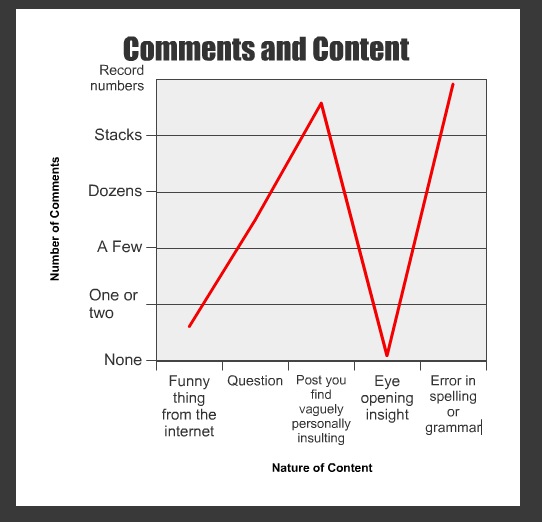Here are all five tips, and here’s my post on the first one.
Comments are great. All bloggers love comments. They make us feel special. Almost as special as a link. Depending on your blog love language (which Simone posted about back in January).
Comments indicate reader engagement. Comments – even negative ones – show that someone cares enough about your ideas to respond.
But if you hang your blogging hat on the number of comments you get – and make a decision to continue, or not to continue, on that basis – then you’re bound for disappointment. People don’t like to comment. I read about 300 blogs, I comment on a handful. I should comment on more – knowing as I do that people like getting comments.
Comments are not a measure of quality. They’re not a measure of how much your post is appreciated. They’re not really a measure of anything except how good you are at annoying people or how cleverly you hook your readers.
Because I like awesome scientific analysis I’ll repost this graph I made a while back.

And further analysis – I mentioned how bad my blog was when I first started the other day (prompting some people to head back to the archives). It was really bad. Terrible. And yet I scored more comments per post in those days by a long shot.
If you’re going to blog for any measurable outcome regular visitors and subscribers. Or blog for google keywords so that you can attract random visitors who might subscribe.
Blogging for comments is a thankless exercise.


How to tell the internet to shut up
Comments are what makes the social internet go round – but they also are a classic example of the signal v noise aspect of effective communication. Annoyingly long comment threads obscure much goodness. You can, though I don’t recommend it, block comments from almost every site you visit around the world wide web, by installing this code snippet in your browser.
It comes with a warning:
Warning:
The stylesheet blindly hides blocks with IDs like “comments”, which could have unexpected side effects. (I’m told it hides the “discussion” section of Bugzilla installations, for example.) Disable shutup.css if you think you might be missing important page content.
Unlike the guy who wrote this plug-in – I like and value your comments, and would appreciate more of them…
July 30, 2010